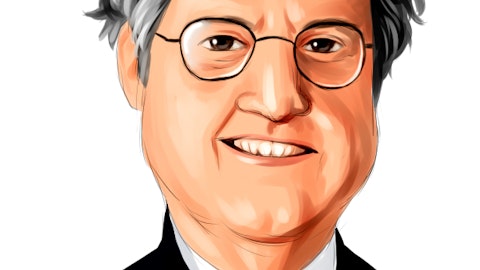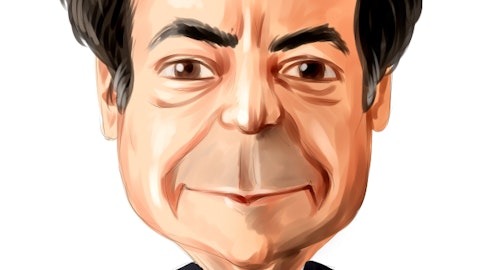Many top name funds have decided that a steadying economy may convince customers to trade up to higher margin grocery items. Even as food inflation is expected to taper off next quarter, one issue for retailers might be their delay in passing costs along to customers, which will compress margins, which will be tightened further by high gasoline prices. Year to date through the third quarter puts the S&P Food & Retail Index up only 6%, compared to a 16% rise for the S&P 1500 over this time period. Thus, it’s important to see which hedge funds are trading these stocks.
The Kroger Co. (NYSE:KR), our first grocer, operates in thirty-one U.S. states and pays a dividend that yields 2.4%. Kroger recently raised its long-term EPS growth target range from 6%-8% to 8%-11%. The company’s growth should be driven by its ability for store expansion, where management expects to spend an additional $200 million per year, on top of the already $2 billion, in an effort to grow square footage. This will also fund mobile platforms and new store designs.
Kroger received some of the greatest support from funds compared to other grocers. Ken Griffin, a modest owner, upped his 1Q stake 100% and Israel Englander upped his 500%. However, the most notable transactions were made by two fund owners with over 2.2 million shares each: D.E. Shaw and Arrowstreet Capital. The duo increased their holdings by over 60% last quarter.
Safeway Inc. (NYSE:SWY) pays a 4.3% dividend, but investors should be wary, as it is on our list of dividend stocks investors are shorting massively. The company has trended downward all year, and is down over 20% year to date. Comp sales were up only 0.1% for last quarter, versus consensus of 2.0%. The company has also seen higher costs and lower margins due to the introduction of a new loyalty program, but benefits from the program are not expected to be recognized until 2013. Although D.E. Shaw is a Kroger fan, he is not so interested in Safeway, dumping over 70% of his 1Q stake during 2Q. Interestingly, Jim Simons took a new position, and Bridgewater Associates moved up to the “two spot” with a 150% share increase in 2Q.
SuperValu Inc. (NYSE:SVU) suspended guidance and its dividend in July. The company is one of our terrible twenty stocks, and since the end of 2Q, the grocer is down almost 45%. The funds feeling the pain of this huge stock slide were several top names, including Chuck Royce, Jim Simons, Tiger Global Management and Brigade Capital. Each owned over 2 million shares at the end of 2Q. The question is, however, should they be holding on for a rebound? SuperValu posted another dismal quarter with same store sales down 4.3%. The company is a turnaround play that is looking to reposition itself as a low cost provider, but we are skeptical, as EPS growth estimates are expected to average 5% annually over the next five years.
The Fresh Market, Inc. (NYSE:TFM) focuses on perishable products and operated 113 stores near the end of 2011. The company has been hitting on all cylinders over the past year by focusing on expanding its store base, increasing comp sales and boosting margins. The company has beat EPS estimates by at least 18% each of the last four quarters and has the highest net profit margin of all the five grocers listed at 4.6%. Columbus Circle Investors took a new position during 2Q that made the firm the top fund owner by shares. Israel Englander and Diamondback Capital followed suit with new positions, and Jim Simons increased his holdings of the grocer by over 1000%.
Whole Foods Market, Inc. (NASDAQ:WFM), the organic food retailer, is expected to see revenues up 12% in 2013 on the back of strong square footage growth of 7.5%. The company has performed well due to its “natural” brand image, and should continue to perform well even as it introduces lower-priced value products. Next to Fresh Market, Whole Foods has the highest net profit margin of our five grocers at 3.4%. Apparent grocer advocate Jim Simons increased his stake in Whole Foods by 60% in 2Q, topped only by Columbus Circle Investors. Meanwhile, Ken Fisher and Jim Chanos took new positions in the company.
Neither of the high-end grocers Whole Foods and Fresh Market pay a dividend, and both trade above 40x earnings. We like the growth prospects of both companies, but are a little wary of the companies’ valuations, as both are also up over 34% year to date.
SuperValu is a speculative play that has a long way to go before it gets serious interest from us. The other two conventional grocers, Kroger and Safeway, pay solid dividends that only represent a payout ratio of around 40%. We prefer Safeway’s 4.3% dividend compared to Kroger’s 2.4% dividend, as well as the company’s valuation, where it trades at only 9x earnings compared to Kroger’s 24x.






